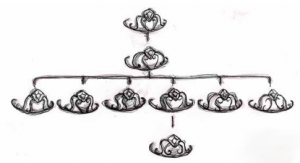Delia Bennett
A First-Hand Look at Debutante Culture
When I first told people I was going home for a week to “come out,” I realized I should have chosen my words more purposefully — or less purposefully. In a naive attempt to be cheeky, I unintentionally let my teachers and classmates assume I was heading home for a much more serious and personal matter, when in fact I was going home for my “coming out” into society. Once the haze of confusion and surprise had cleared, I revealed that “coming out” in society more or less meant participating in a debutante ball.
I come from a long line of Southern debutantes, my great-grandmother, grandmother, my mother and her five sisters, to be exact. It’s a tradition that, as it was explained to me in a Mulan-esque way as a child, somehow brings honor to our family. Although the bourgeois veil of arranged or “pre-destined” marriages was lifted — thankfully — long before my mother, her sisters and their mother, placed their delicate hands in the traditional long, white, leather gloves of debutante society, I still found myself trapped in a net of familial obligations that, if not fulfilled, would lead to certain disappointment and possible shunning. When the siren song of gorgeous gowns and sparkling stilettos failed to lure me in, my parents decided to bribe me with the promise of paying for grad school and beyond — I only needed to sell my soul to society and financial and educational security would be mine.

So I signed. I resigned myself to the jokes my friends would make, and signed receipts for silk-crepe and tulle ivory gowns, signed off on designs for custom made suits, signed more receipts for shoes to dance in, shoes to walk in, shoes to waltz in — yes there’s a difference — and signed salutations and thank you notes until I had miniscule callouses on my fingertips. Once the first ball was done with, a night which was highlighted by the mother of one of my fellow debs pulling me aside to tell me that her deb night — some 40 years ago — was one of the best nights of her life, I was more than ready to put the second, and last, behind me. I approached the next ball with the same casual disregard and ambivalence that I’d had for the first even though several of my friends were flying down from New York, even though my parents had orchestrated the weekend as you might orchestrate a coronation and even though my mother continued to coo, day and night, that she had been waiting for this moment for me her whole life.
I know I said that I only agreed to do it so that my parents would pay for grad school and support me when my first editorial assistant paycheck won’t even begin to cover my rent — ok and maybe I did it for the shoes and booze — but something changed somewhere along my pathway to womanhood; I changed. It wasn’t an archaic institution for me to make fun of and stamp my feet in rebellion, it was my mother’s heritage. Sure, you can argue that societal clubs, cliques, organizations — whatever you want to call them — take women back to the stone age, reduce us to pretty little dolls, seen but not heard, make any argument you’d like because I’ve probably already made it. But what are we as a people if we refuse to acknowledge our heritage? If we mock those who came before us and the women whose years in society were the best years of their life? My grandmother once told me that women of our time are too crass; We always seem to be trying to prove something when the women of her generation paved the way for women’s rights long ago. “Don’t let the feminine spirit die,” she told me. This tradition served to remind me who I am, where I come from, and where my ancestors came from. These organizations strive to maintain the elegance that is synonymous with young girls becoming women, poise, grace, manners above all and where would I be in life if I didn’t know how to curtsey? But really, with the dawning of the industrial revolution, iEverythings and China slowly but surely securing world domination, our history is dying.
I can probably pinpoint for you the exact moment in which I realized there are things in life that are bigger than you, seemingly superficial sacrifices we’ll make, but neither words nor pictures can illustrate what it was like walking out onto the grand ballroom’s marbled floor — the same one my mother and her people traipsed upon — and seeing her weep with joy and excitement. For that night, I was the princess she’d always wanted me to become and the girl she wished she could be again. I tried to avoid the tears that followed in the same way that I tried in vain to avoid this sappy-hearted ending, but some things in life are simply unavoidable.







Leave a Reply